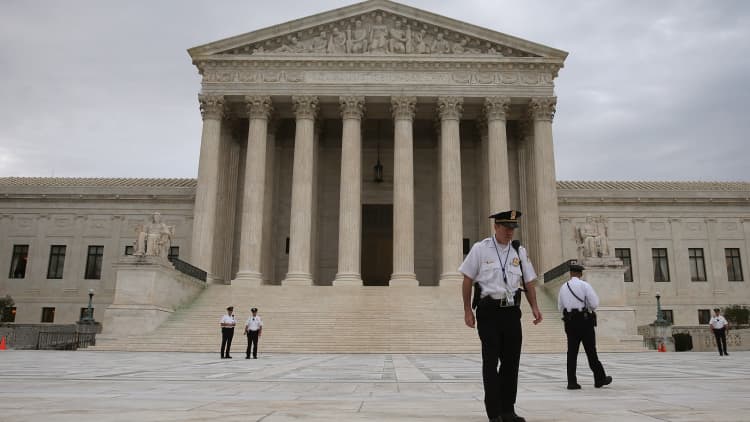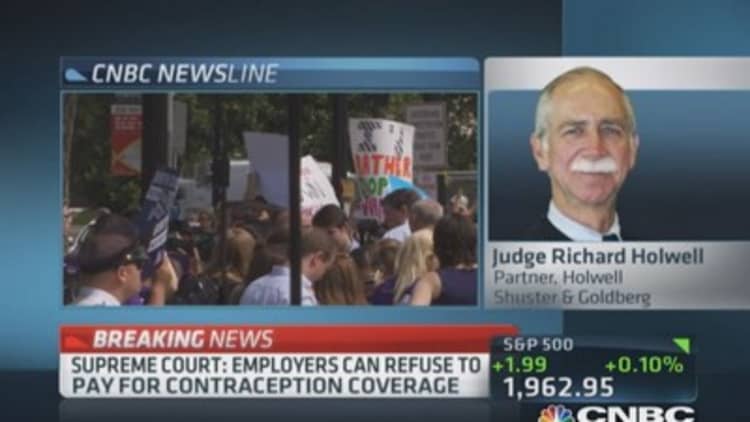
The U.S. Supreme Court ruled Monday that certain for-profit companies can claim a religious exemption to Obamacare's mandate that their health plans covers contraception without requiring employees to pay out-of-pocket costs for that birth control.
The greatly anticipated 5-4 ruling in the so-called Hobby Lobby case was a blow to the Obama Administration's landmark health-care reform law, finding that that contraceptive mandate "substantially burdens the exercise of religion" by the families that own the companies that challenged that rule.
"It requires the Hahns and the Greens to engage in conduct that seriously violates their sincere religious beliefs that life begins at conception," said majority ruling written by conservative Justice Samuel Alito.
But a number of qualifications in the decision mean that Obamacare's contraception mandate will still apply to most employers.
The decision only applies to so-called "closely held corporations," such as the ones in this case, which are each owned by a single family, whose Christian beliefs lead to opposition to certain types of contraception that they believe cause abortions.
The ruling also was careful to note that "this decision concerns only the contraception mandate" and does not apply to the question of whether for-profit companies could claim a religious exemption for other potentially controversial procedures such as vaccinations or blood transfusions.
"Nor does it provide a shield for employers who might cloak illegal discrimination as a religious practice," the opinion said in upholding the companies right to challenge the contraception mandate under the federal Religious Freedom Restoration Act. The RFRA had previously been understood to individuals, not corporations.
The Obama Administration within hours of the ruling called for Congress to take action to ensure that the women at the companies involved in the case have access to the contraception they want.
"President Obama believes that women should make personal health care decisions for themselves, rather than their bosses deciding for them," said White House spokesman Josh Earnest. "Today's decision jeopardizes the health of women that are employed by these companies."
"The president's going to look to Congress to put in a place a solution," said Earnest, who also left open the possibility that Obama would take executive action to mitigate the effects of the ruling.
Read MoreFlorida Obamacare rates still a secret
Alito was joined in the decision with his fellow conservatives on the high court, Chief Justice John Roberts, Antonin Scalia, and Clarence Thomas, as well as by Justice Anthony Kennedy, who is frequently a key swing vote. Dissenting were the liberal justices, including the court's three female members.
One of them, Justice Ruth Bader Ginsburg, in a strong written dissent called the majority ruling "a decision of startling breadth."
"The court holds that commercial enterprises, including corporations, along with partnerships and sole proprietorships, can opt out of any law (saving tax laws) they judge incompatible with their sincerely held religious beliefs," Ginsburg wrote. "The court, I fear, has ventured into a minefield . . . by its immoderate reading of the RFRA,"
The Obama Administration could step in to foot the bill for the contraceptives sought by employees of the two companies in this case, Hobby Lobby and Conestoga Wood Specialists, or in future ones where other for-profit companies successfully claim a religious exemption to the mandate.
The administration faces pending challenges to the contraception mandate from a number of religious non-profit entities who object to a workaround the administration had crafted to answer their concerns about the mandate infringing on religious beliefs.
In the case decided Monday, the large arts-and-crafts store operator Hobby Lobby and cabinet manufacturer Conestoga Wood Specialists specifically objected to the mandate that their plans cover two particular types of emergency contraceptives, Ella and Plan B, which they consider to be abortifacients (a drug or an agent that causes premature delivery), or pay a fine.
Hobby Lobby also objected to the mandate that intrauterine devices, IUDs, be included in the contraceptives covered by their employee health plan.
Hobby Lobby and a related company faced fines of about $490 million per year if they refused to include the contraceptives they objected to, while Conestoga faced fines of of $33 million per year. If they had dropped their health plans altogether, which was an option the Obama Administration noted they had, Hobby Lobby faced penalties exceeding $26 million annually, while Conestoga faced a $1.8 million annual fine.
Read MoreObamacare's 95% fix: Auto re-enroll
While the Obama Administration had granted a qualified "accommodation" to religious non-profit entities that allowed them under circumstances to avoid complying with the contraception mandate, there is no such provision for for-profit companies such as the ones in the Supreme Court cases. The court had never before said that such corporations have religious rights under the Religious Freedom Restoration Act, the 1993 law signed by President Clinton
Hobby Lobby, which employs more than 13,000 people, has 514 crafts stores in 41 states. The Protestant family that owns Hobby Lobby, the Greens, also runs a small, 35-store chain of Mardel book stores, which specializes in Christian books.
Conestoga Wood Specialists is owned the Hahns, a family of Mennonites in Pennsylvania, and has about 950 workers.

Monday's ruling went against prevailing public opinion on the issue.
In a recent Reuters/Ipsos poll, 53 percent of Americans said they opposed letting employers using their religious beliefs to decide what kinds of contraceptives should be covered by their health plans, while 35 percent said they agreed with that idea.
The pro-abortion rights group NARAL Pro-Choice America blasted the Supreme Court decision.
"Today's decision from five male justices is a direct attack on women and our fundamental rights. This ruling goes out of its way to declare that discrimination against women isn't discrimination," said Ilyse Hogue, President of NARAL Pro-Choice America.
"Allowing bosses this much control over the health-care decisions of their employees is a slippery slope with no end. Every American could potentially be affected by this far-reaching and shocking decision that allows bosses to reach beyond the boardroom and into their employees' bedrooms. The majority claims that its ruling is limited, but that logic doesn't hold up. Today it's birth control; tomorrow it could be anypersonal medical decision, from starting a family to getting life-savingvaccinations or blood transfusions.
"Ninety-nine percent of women use birthcontrol at some point in our lives, and none of those stories made it into thearguments. It's outrageous that these five male justices chose to single out birth control for special discrimination.
Read MoreXmas gifts first, then Obamacare: Study
But a number of Republican legislators, who oppose Obamacare overall, applauded the ruling.
"Today the Supreme Courtsided with our Constitutional rights and stood up to the Obama Administration's assault on religious liberty," said US Rep. Diane Black, R-TN. "Being an American has always meant being able to freely choose our faith and live by the dictates of that faith at home, at church and in the public square. But under the [Obamacare]mandate, this fundamental right has come under attack. The bottomline is that increasing access to healthcare should never require forcing people to choose between coverage and their conscience."
Her Congressional colleague Rep. Michele Bachmann, R-MN, said "I am extremely encouragedby today's Supreme Court decision to uphold the religious liberty rights of the Green family of Hobby Lobby."
"At its core, today's decision was about the right of individual and family business owners to be free from government mandates that force them to deny their sincerely-held religious beliefs," Bachmann said "America was founded on the principle of religious freedom, and there is nothing more fundamental than the First Amendment. This decision represents a tremendous victory for the basic constitutional rights of every American."
The cases decided Monday ended up at the high court after Obama Administration asked the Supreme Court to hear its appeal of a 10th Circuit Court of Appeals decision that Hobby Lobby was likely to succeed in its claims
The cases was argued March 25, with former Solicitor General Paul Clement representing Hobby Lobby and Conestoga, and current Solicitor General Donald Verrilli representing the US government.
It was a return match for the two high-powered lawyers, who had last squared off before the Supreme Court in 2012 to argue over the constitutionality of Obamacare itself.
That case ended in a split decision, albeit a lop-sided one in Verrilli's favor. A majority of the justices, including, surprisingly, Roberts ruled that the Affordable Care Act's mandate compelling most Americans to buy insurance or pay a fine was constitutional.
Read MoreUsing tax as a weapon in Obamacare fights: Novak
However, a majority of the justices ruled that the federal government could not compel individual states to expand Medicaid eligibility to include all poor adults, as the ACA called for. Instead, it was left up to each state to decide that question: so far, 26 have either expanded Medicaid eligibility, or moved to do so in one shape or form.
During the Hobby Lobby/Conestoga arguments, the court's liberal female justices, including Sonia Sotomayor and Elena Kagan, challenged Clement with concerns that ruling in the two companies' favor would open a Pandora's Box in which privately held businesses use the the religious freedom argument to challenge requirements that they cover a slew of medical procedures or other aspects of employment law.
Clement had just barely begun making his oral arguments, which noted how contraception was "religiously sensitive," when Sotomayor interrupted him to ask, "Is your claim limited to sensitive materials like contraceptives, or does it include items like blood transfusions, vaccines?"
"For some religions, products made of pork?" she asked.
But several male conservative justices, among them Chief Justice Roberts and Alito, pressed Verrilli on questions about why a corporation should be barred from exercising a constitutional claim such as freedom of religion, and why there was good reason to believe that ruling in favor of a company that is closely held by a family would open the door to similar claims by large, publicly traded corporations.
Kennedy, who ended up yet again being the swing vote in a major case,, asked pointed questions of both side.
On Friday, three days before the Supreme Court ruling, the Obama Administration issued a press release that prominently mentioned data showing that women had saved nearly a half billion dollars in 2013 because of the ACA mandate that oral contraceptives be covered by health plans without out-of-pocket cost sharing by the covered individual.
The Health and Human Services Department said in a related report that the total number of prescriptions for oral contraceptives bought with no co-payment grew from 6.8 million in 2012 to 31.1 million last year. The number of individual women who made such purchases without co-payments grew from 1.2 million in 2012 to 5.1 million in 2013.
"By making preventive services more affordable and accessible, this is one way the Affordable Care Act is helping women," HHS said in its report.
--By CNBC.com


